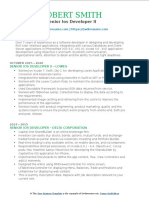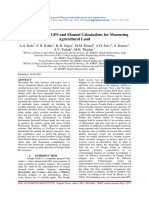Algorithms Assignment
Uploaded by
Serene InAlgorithms Assignment
Uploaded by
Serene InAssignement 1
COSC 3P03, Algorithms
Fall, 2013
Due: 5:00 pm, Oct. 1, Tuesday.
1. (10) Given an array A[1..n] (not sorted), the following is a divide-and-conquer algorithm that nds the maximum
of the array:
find_max(A[1..n])
if n=1 return A[n]
else
temp_max = find_max(A[1..n-1])
return max(temp_max, A[n])
Let t(n) be the time for the algorithm, give a recurrence for t(n) and solve it.
Design a dierent divide-and-conquer algorithm by dividing the input into two (roughly) equal parts. You need
to come up with a recurrence for its running time and solve it.
2. (10) List the functions below from lowest order to highest order. If any two or more are of the same asymptotic
order, group them together.
log log n
3
,
i=0
1/a
i
, where a > 1,
2
log
n
, 2
n
, (5/2)
n
, n
4
, e
n
, log
5
n, nlog n, log log n
5
, log
1/2
n, n
2
4
log n
, 2013,
2 + 4 + 6 + + n(n even), 20, (n
2
1)/(n 1),
3. (7) Show that
n
i=1
log i = O(nlog n).
4. (13) Indicate, for each pair of expressions (A, B) in the table below, whether A is O, o, , or of B. Assume
that k > 1 and c > 1 are constants. Your answer should be in the form of the table with yes or no written
in each box.
A B O o
log
k
n log n
k
n
k
k
n
2
n
2
cn
2
n
2
n+1
n
log c
c
log n
log
5
3
n log
500
100
n
log(n!) log(n
n
)
100n + log n n + (log n)
2
log n log(n
2
)
n
2
/ log n nlog
2
n
(log n)
log n
n/ log n
n
1/2
(log n)
5
n2
n
3
n
1
5. (20) Solve the recurrence in asymptotically tight big Oh function:
t(n) = n +
k
i=1
t(a
i
n),
for two cases (a) where
k
i=1
a
i
< 1, and (b) where
k
i=1
a
i
= 1, using both the substitution and recursion
tree methods.
6. (10) Use as many methods as possible to solve the following recurrence:
t(n) = 2t(n/2) + 1.
7. (10) Solve the following recurrences using the methods specied. You can make any reasonable assumptions
about the parameter n and initial conditions. Note that you only need to solve t(n) in terms of the big Oh
notation.
(a) t(1) = 1, t(n) = 3t(n/2) + n, iteration.
(b) t(n) = 2t(n/2) + nlog n, substitution.
8. (10) Solve the following recurrences by the masters method, if possible. In case(s) where the method does not
apply, state why and solve it/them by other means (hint: you may encounter the harmonic number/series).
t(n) = 4t(n/2) + n
t(n) = 4t(n/2) + n
2
t(n) = 4t(n/2) + n
3
t(n) = 2t(n/2) + n/ log n
9. (10) What is the Big Oh function for each of the following functions of n, where k is an integer (it should be
as tight and as simple as possible). There is no need to justify your answers.
a. t(n) = (nlog n
100
)/2 + f(n), where f(n) = o(n)
b. t(n) = n + (n + 1) + (n + 2) + ... + (n + n), where n is even
c. t(n) = log
1.5
n + log(n
2
)
d. t(n) = 16
log n
e. t(n) = 1 + 3 + 3
2
+ ... + 3
n
+ 3
n+1
+ 3
n+2
f. t(n) = log 1 + log 2 + ... + log n
g. t(n) = 4n
3/4
+ 5nlog n + 2nlog log n
h. t(n) = 1 + 2 + 3 + 4 + ... + 2013 + sin(n)
i. t(n) = t(n/9) + t(9n/11) + cn
j. t(n) =
n
i=0
n
i
You might also like
- Eli Lilly's Project Resilience (A) : Anticipating The Future of The Pharmaceutical Industry.No ratings yetEli Lilly's Project Resilience (A) : Anticipating The Future of The Pharmaceutical Industry.17 pages
- Introduction To Programming MethodologyNo ratings yetIntroduction To Programming Methodology48 pages
- Android Interview Questions Cheat SheetNo ratings yetAndroid Interview Questions Cheat Sheet26 pages
- Algorithms and Data Structures Lecture Slides: Asymptotic Notations and Growth Rate of Functions, Brassard Chap. 3No ratings yetAlgorithms and Data Structures Lecture Slides: Asymptotic Notations and Growth Rate of Functions, Brassard Chap. 366 pages
- An Intuitive Introduction To Data StructuresNo ratings yetAn Intuitive Introduction To Data Structures183 pages
- A Beginner's Guide To Big O Notation Rob Bell PDFNo ratings yetA Beginner's Guide To Big O Notation Rob Bell PDF6 pages
- 100+ Java Interview Questions and Answers For 2020 - EdurekaNo ratings yet100+ Java Interview Questions and Answers For 2020 - Edureka60 pages
- Distinct Problem - July Easy' 19 - HackerEarthNo ratings yetDistinct Problem - July Easy' 19 - HackerEarth3 pages
- Android Studio 3.6 Development Essentials - Java Edition: Developing Android 9 (Q) Apps Using Android Studio 3.5, Java and Android JetpackFrom EverandAndroid Studio 3.6 Development Essentials - Java Edition: Developing Android 9 (Q) Apps Using Android Studio 3.5, Java and Android JetpackNo ratings yet
- Top 50 OOPs Interview Questions and AnswersNo ratings yetTop 50 OOPs Interview Questions and Answers6 pages
- Data Structure & Algorithm: Prepared by Ms. Chyril A. Concemino, Mba, Mist100% (1)Data Structure & Algorithm: Prepared by Ms. Chyril A. Concemino, Mba, Mist61 pages
- Android Interview Questions and Answers - Java Code GeeksNo ratings yetAndroid Interview Questions and Answers - Java Code Geeks5 pages
- Ample Coder: Cognizant Professional Placement MaterialNo ratings yetAmple Coder: Cognizant Professional Placement Material23 pages
- Study-Materials CSE 6th Cryptography-Network-Security S.-DalaiNo ratings yetStudy-Materials CSE 6th Cryptography-Network-Security S.-Dalai63 pages
- LeetCode Question Difficulty Distribution PDFNo ratings yetLeetCode Question Difficulty Distribution PDF4 pages
- Android Studio 3.6 Development Essentials - Kotlin Edition: Developing Android 10 (Q) Apps Using Android Studio 3.6, Kotlin and Android JetpackFrom EverandAndroid Studio 3.6 Development Essentials - Kotlin Edition: Developing Android 10 (Q) Apps Using Android Studio 3.6, Kotlin and Android JetpackNo ratings yet
- Android Studio 3.4 Development Essentials - Kotlin Edition: Developing Android 9 Apps Using Android Studio 3.4, Kotlin and Android JetpackFrom EverandAndroid Studio 3.4 Development Essentials - Kotlin Edition: Developing Android 9 Apps Using Android Studio 3.4, Kotlin and Android JetpackNo ratings yet
- Android Studio 3.2 Development Essentials - Android 9 Edition: Developing Android 9 Apps Using Android Studio 3.2, Java and Android JetpackFrom EverandAndroid Studio 3.2 Development Essentials - Android 9 Edition: Developing Android 9 Apps Using Android Studio 3.2, Java and Android JetpackNo ratings yet
- Monkey and The Wedge - Panchatantra Picture StoryNo ratings yetMonkey and The Wedge - Panchatantra Picture Story3 pages
- The Fox and The Crow & The Miser - Kids StoryNo ratings yetThe Fox and The Crow & The Miser - Kids Story2 pages
- The Dragon Rock by Ellena Ashley - Kids StoryNo ratings yetThe Dragon Rock by Ellena Ashley - Kids Story4 pages
- The AAC Rubric Wordsmith The AAC Rubric WordsmithNo ratings yetThe AAC Rubric Wordsmith The AAC Rubric Wordsmith6 pages
- Risk Assessment: A Practical Guide To Assessing Operational RiskNo ratings yetRisk Assessment: A Practical Guide To Assessing Operational Risk29 pages
- كيف يؤثر رضا الزبون على نية الشراء؟ دراسة الدور الوسيط للكلمة المنقولةNo ratings yetكيف يؤثر رضا الزبون على نية الشراء؟ دراسة الدور الوسيط للكلمة المنقولة7 pages
- Chapter 8 (Cont.) : Gauge and Measurement System Capability AnalysisNo ratings yetChapter 8 (Cont.) : Gauge and Measurement System Capability Analysis11 pages
- Platformized Intellectual - Theoretical Contributions, Scope and Digital Limits of PraxisNo ratings yetPlatformized Intellectual - Theoretical Contributions, Scope and Digital Limits of Praxis25 pages
- A Comparison of GPS and Manual Calculations For Measuring Agriculture LandNo ratings yetA Comparison of GPS and Manual Calculations For Measuring Agriculture Land7 pages
- Multiple Perspectives of The One Laptop PDFNo ratings yetMultiple Perspectives of The One Laptop PDF4 pages
- gr4 Unit 1a Earth Features and ProcessesNo ratings yetgr4 Unit 1a Earth Features and Processes8 pages
- Lahore University of Management Sciences: Home Campus Email Pay Online Contact ListNo ratings yetLahore University of Management Sciences: Home Campus Email Pay Online Contact List14 pages
- Muhammad Nur Helmi Bin Mohd Mislim 2020845232 BCT563 Assignment2 PDFNo ratings yetMuhammad Nur Helmi Bin Mohd Mislim 2020845232 BCT563 Assignment2 PDF6 pages
- Equity Fund Management Course Outline TYBBA 2021 22No ratings yetEquity Fund Management Course Outline TYBBA 2021 225 pages








































































































